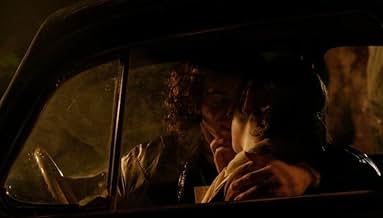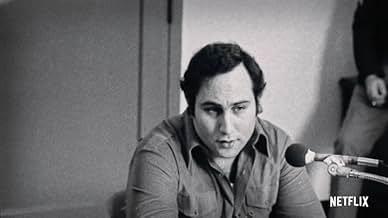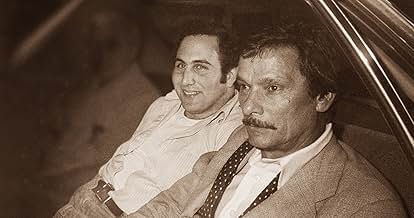Mixing present-day interviews with previously unheard recordings, this true-crime series examines serial killer David Berkowitz's mark on 1970s New York.Mixing present-day interviews with previously unheard recordings, this true-crime series examines serial killer David Berkowitz's mark on 1970s New York.Mixing present-day interviews with previously unheard recordings, this true-crime series examines serial killer David Berkowitz's mark on 1970s New York.
Browse episodes
Featured reviews
Well, this is the 4th entry in the Conversations with a Killer documentary series on Netflix, and once again, it's a pretty solid Joe Berlinger effort. Having directed the other 3, Berlinger knows how to strike a balance between handling the sensitive side of the killings and conveying the essence of the series' title, i.e., the tapes. Berkowitz was not an easy person to understand - some of his actions stemmed from deep-seated trauma, anger, and hatred (right from his unsettling childhood), while some others felt spontaneous, attention-seeking, and trying to capitalize on notoriety.
Like the rest, we get 3 episodes of roughly an hour each, told in a non-linear fashion, cutting and stitching across various timelines in Berkowitz's life. The re-enactments are pretty good, as is the case with Berlinger's earlier works, blended with real footage from those times, adding to the retro intensity. How Berkowitz held a large section of NYC in fear for over a year is something that's worthy of a larger discussion. I appreciate how Berlinger concluded the series with the friends, lovers, and acquaintances of the victims sharing why they believe the victims deserve to be remembered beyond being Berkowitz's "targets."
P. S. Parts of episode 3 felt filler-like, especially because that was extensively covered in The Sons of Sam: A Descent Into Darkness.
Like the rest, we get 3 episodes of roughly an hour each, told in a non-linear fashion, cutting and stitching across various timelines in Berkowitz's life. The re-enactments are pretty good, as is the case with Berlinger's earlier works, blended with real footage from those times, adding to the retro intensity. How Berkowitz held a large section of NYC in fear for over a year is something that's worthy of a larger discussion. I appreciate how Berlinger concluded the series with the friends, lovers, and acquaintances of the victims sharing why they believe the victims deserve to be remembered beyond being Berkowitz's "targets."
P. S. Parts of episode 3 felt filler-like, especially because that was extensively covered in The Sons of Sam: A Descent Into Darkness.
I was a kid when all of this was going on. I also lived a few blocks from where the third shooting took place. (I still live a few blocks from that location but I'm east of it now instead of west of it.) Because of those reasons I'll watch pretty much anything that comes out about the killings. "Conversations with a Killer: The Son of Sam Tapes" does a pretty job telling the story. I found the actual recordings of David Berkowitz' voice uninteresting. I have no interest in listening to what a murderer has to say, especially one who keeps changing his story. I also didn't like how the show poo-poos the idea of there being more than one shooter. If it was only Berkowitz, why, all of these years later, is the case still considered open in the borough of Queens?
Let's be sure that laypeople are in full possession of the facts before viewing this program:
1.) All of the canonical Son of Sam crimes were committed with .44 caliber handguns. Wendy Savino was shot with a .32.
2.) Savino didn't fit the Son of Sam victim profile. Most conspicuously, she was significantly older than any of the Son of Sam victims.
3.) The official narrative holds that David Berkowitz acted alone. Eyewitnesses reported that Savino's shooter "drove off in a car with two other men" (New York Daily News, April 11, 1976). If Berkowitz shot Wendy Savino, who were these two men? Who assisted his getaway?
4.) The shooter "probably was Italian," Savino said at the time (see aforementioned Daily News story). The police sketch reflected that observation.
The case made by the NYPD for Savino as a Son of Sam attack is laughable, and the case made for David Berkowitz as the lone Son of Sam shooter is equally spurious. What the average observer may not know is that Berkowitz never stood trial: he simply confessed to all of the attacks, and that was that. Evidence of the involvement of other individuals and vehicles was swept under the rug; the numerous holes in Berkowitz's 1977 confession were ignored. Berkowitz didn't know the color of Rosemary Keenan's car, for example. He told police that the vehicle was red, but it was navy blue. Also, he insisted that Joanne Lomino and Donna DeMasi were running up the porch steps of the Lomino home when they were shot. Not so, Lomino told prosecutors (quoting from Maury Terry's "The Ultimate Evil"): "We were on the sidewalk talking. We walked over to the porch and we were standing for about five minutes. I heard a voice, then turned around and the guy pulled a gun and started shooting at us." (The Lomino-DeMasi shooter was described by both victims as a slim man with straight, dirty blond hair. After his arrest, Berkowitz told police that he "just popped out" from a lot around the corner before shooting the young women - but no such lot existed.) These are basic details that Berkowitz would have known if he had actually been the lone attacker.
Ballistic evidence likewise came up short: all of the Son of Sam attacks were *not*, in fact, linked to a single weapon. The bullets recovered from the scene of the Carl Denaro-Rosemary Keenan shooting, for example, were too deformed to be traced back to any gun - Berkowitz's or otherwise. (And who was the shaggy blond-haired shooter in the final Son of Sam attack, that of Stacy Moskowitz and Robert Violante? Berkowitz didn't look even remotely like this individual.)
Bear these facts in mind, and reiterate them, when someone tells you that David Berkowitz was solely responsible for the Son of Sam attacks or that he was the shooter of Wendy Savino. "Conversations with a Killer: The Son of Sam Tapes" is irresponsible in both conception and presentation, and prominently features one self-appointed "authority" with an extensively documented history of insulting and threatening other members of the research community and even surviving Son of Sam victims. These attacks are of the grossest sort, and the individual in question has made himself an object of universal loathing.
Son of Sam is not an unapproachably esoteric case. Portions of investigative journalist Maury Terry's case notes have been made publicly available; by checking the names of additional suspects against newspaper records, and making phone calls to individual sources, you can confirm much of what is alleged to have happened. The answer is yes: Berkowitz had accomplices, there *was* a cult in Yonkers, and its members were involved in precisely the kind of activity (child trafficking, drugs, et al.) that Terry, Berkowitz, and other sources have said they were.
1.) All of the canonical Son of Sam crimes were committed with .44 caliber handguns. Wendy Savino was shot with a .32.
2.) Savino didn't fit the Son of Sam victim profile. Most conspicuously, she was significantly older than any of the Son of Sam victims.
3.) The official narrative holds that David Berkowitz acted alone. Eyewitnesses reported that Savino's shooter "drove off in a car with two other men" (New York Daily News, April 11, 1976). If Berkowitz shot Wendy Savino, who were these two men? Who assisted his getaway?
4.) The shooter "probably was Italian," Savino said at the time (see aforementioned Daily News story). The police sketch reflected that observation.
The case made by the NYPD for Savino as a Son of Sam attack is laughable, and the case made for David Berkowitz as the lone Son of Sam shooter is equally spurious. What the average observer may not know is that Berkowitz never stood trial: he simply confessed to all of the attacks, and that was that. Evidence of the involvement of other individuals and vehicles was swept under the rug; the numerous holes in Berkowitz's 1977 confession were ignored. Berkowitz didn't know the color of Rosemary Keenan's car, for example. He told police that the vehicle was red, but it was navy blue. Also, he insisted that Joanne Lomino and Donna DeMasi were running up the porch steps of the Lomino home when they were shot. Not so, Lomino told prosecutors (quoting from Maury Terry's "The Ultimate Evil"): "We were on the sidewalk talking. We walked over to the porch and we were standing for about five minutes. I heard a voice, then turned around and the guy pulled a gun and started shooting at us." (The Lomino-DeMasi shooter was described by both victims as a slim man with straight, dirty blond hair. After his arrest, Berkowitz told police that he "just popped out" from a lot around the corner before shooting the young women - but no such lot existed.) These are basic details that Berkowitz would have known if he had actually been the lone attacker.
Ballistic evidence likewise came up short: all of the Son of Sam attacks were *not*, in fact, linked to a single weapon. The bullets recovered from the scene of the Carl Denaro-Rosemary Keenan shooting, for example, were too deformed to be traced back to any gun - Berkowitz's or otherwise. (And who was the shaggy blond-haired shooter in the final Son of Sam attack, that of Stacy Moskowitz and Robert Violante? Berkowitz didn't look even remotely like this individual.)
Bear these facts in mind, and reiterate them, when someone tells you that David Berkowitz was solely responsible for the Son of Sam attacks or that he was the shooter of Wendy Savino. "Conversations with a Killer: The Son of Sam Tapes" is irresponsible in both conception and presentation, and prominently features one self-appointed "authority" with an extensively documented history of insulting and threatening other members of the research community and even surviving Son of Sam victims. These attacks are of the grossest sort, and the individual in question has made himself an object of universal loathing.
Son of Sam is not an unapproachably esoteric case. Portions of investigative journalist Maury Terry's case notes have been made publicly available; by checking the names of additional suspects against newspaper records, and making phone calls to individual sources, you can confirm much of what is alleged to have happened. The answer is yes: Berkowitz had accomplices, there *was* a cult in Yonkers, and its members were involved in precisely the kind of activity (child trafficking, drugs, et al.) that Terry, Berkowitz, and other sources have said they were.
Who directed this garbage?? The Son of Sam Decent Into Darkness, just to name one, does the job well of telling the story. I got through the first episode of this one, barely, and shut it off. Not sure what the directors were thinking here, other than, let's put out the same info, change things up a bit and present it to Netflix. What a joke. I don't understand how crap like this even gets picked up. There are so many cases out there left untold, but let's continue to beat the dead horse. I guess it's easier, not much thinking or effort needed. And after reading another viewers comment about the directors trying to pin another case on Berkowitz, left out more than half of the story, is not a surprise. No effort went into this whatever u want to call it, why bother presenting all the evidence, right. Bait and switch at its finest.
The docuseries delves deeply into every event in David Berkowitz's life, helping us understand how he forged the personality that would later become a prolific serial killer. While his attacks are described as a common thread, his experiences in childhood, adolescence, and adulthood are narrated in parallel, with a back-and-forth that provides context for Berkowitz's actions. The jumps in time do not confuse the chronology of events; on the contrary, they enrich the story. Added to all this is the juicy testimony of the killer himself, now in prison, in which he clarifies his experiences.
Details
- Release date
- Country of origin
- Language
- Also known as
- Conversaciones con asesinos: Las cintas del Hijo de Sam
- Production companies
- See more company credits at IMDbPro
- Runtime
- 1h(60 min)
- Color
Contribute to this page
Suggest an edit or add missing content







































